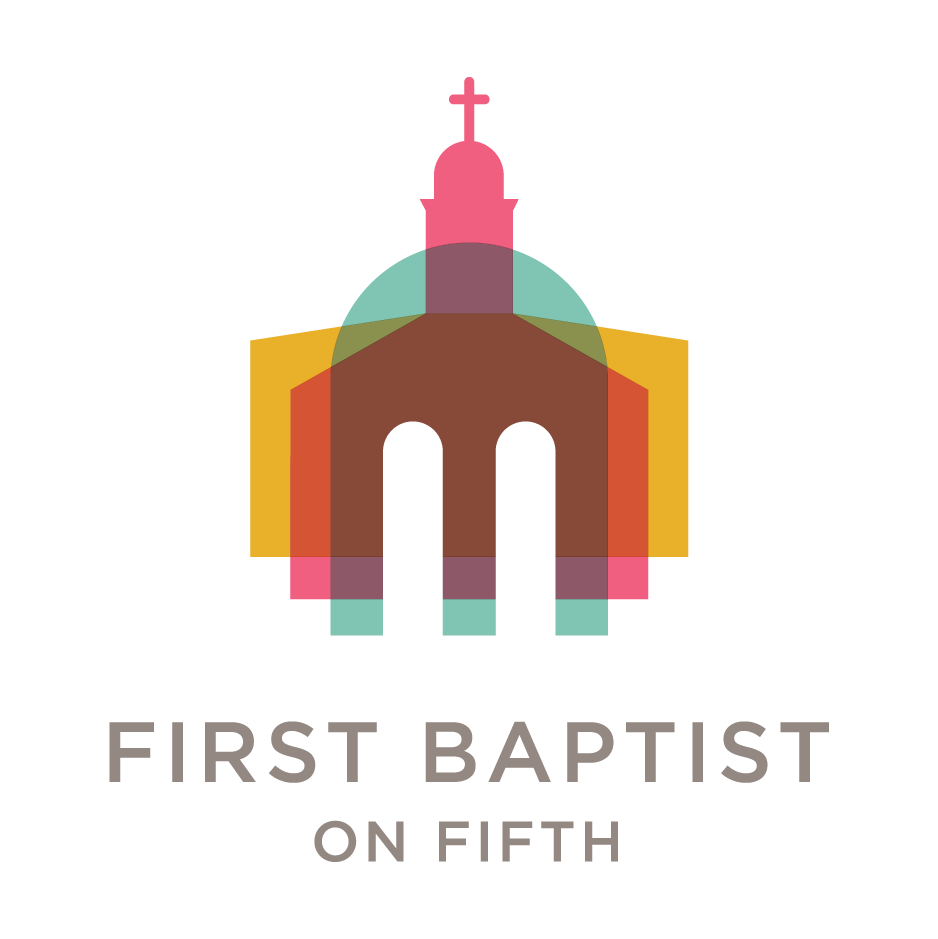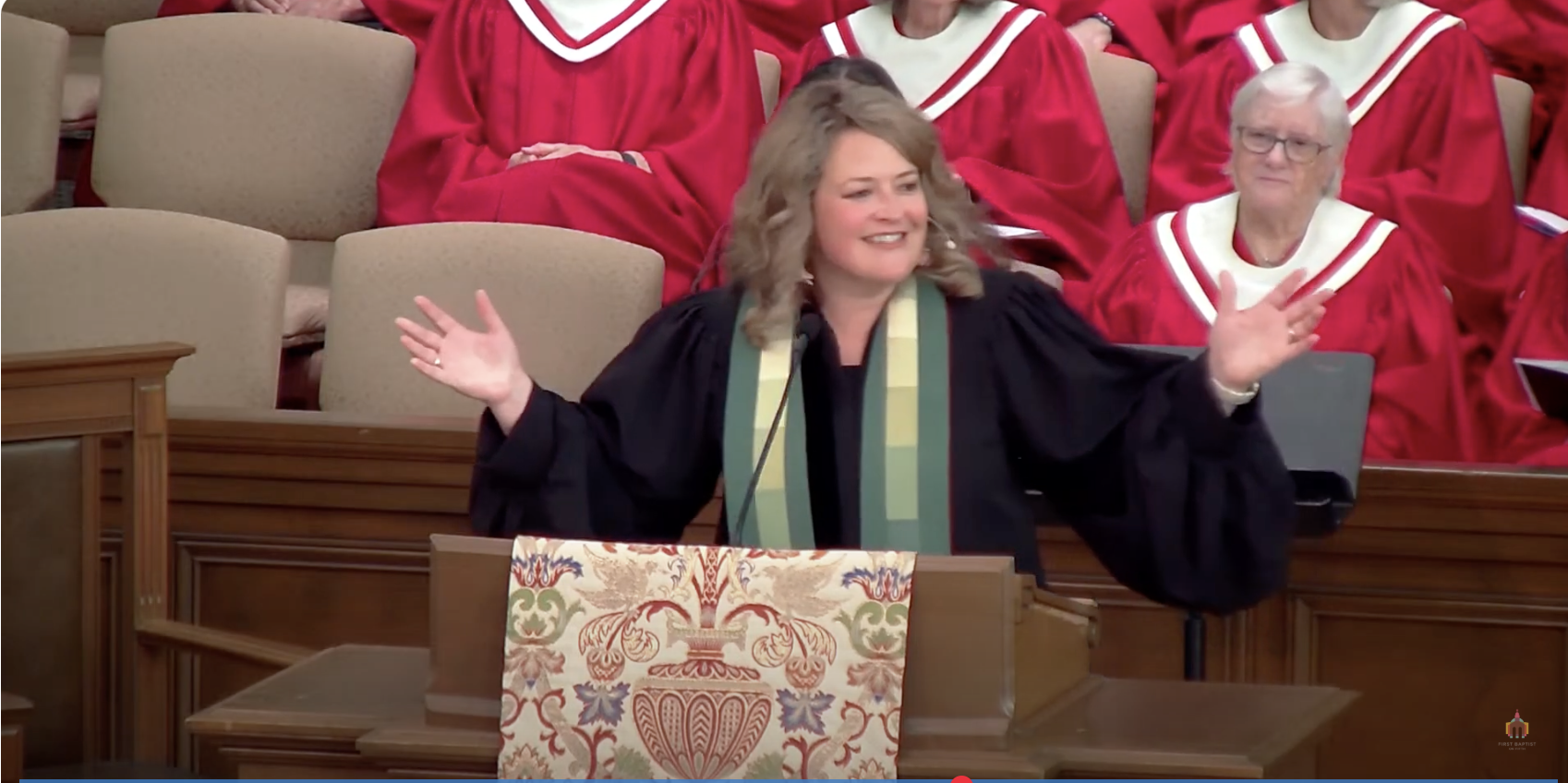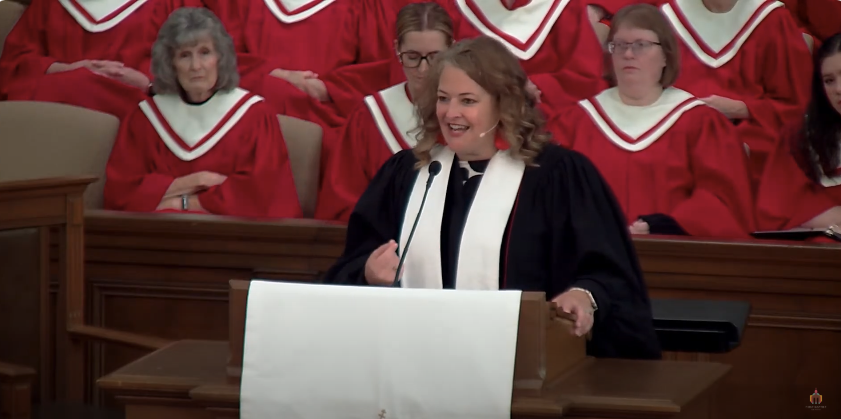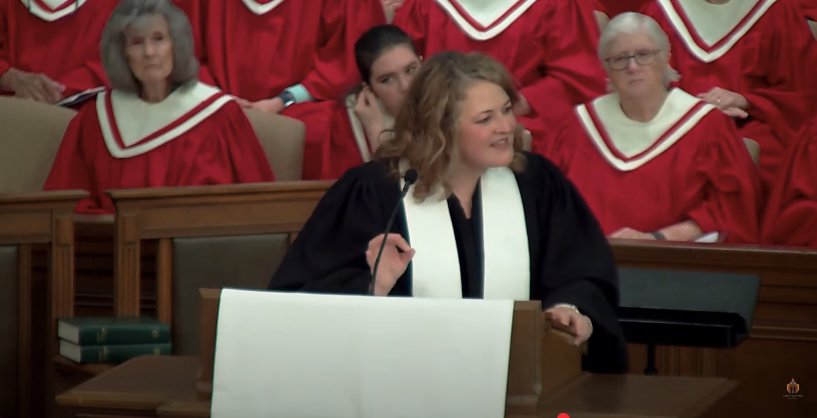IHe shuffles through this world, practically daring someone to see him. Overlooked and oppressed by every earthly measure, he prefers to blend in and be passed by. Where others have a family, friends, meaningful work, a home with safety and dignity, a hope for what is yet to be, he travels alone, scared, unsure of what even tomorrow will bring.
He descends from our ancestors of scripture, those who by their circumstances were kept invisible: the woman bent over for 18 years, the boy afflicted with evil spirits, the man with leprosy by the gates, the hemorrhaging woman just aching for relief, the slave girl Hagar who came before him. Invisible, to be clear, to the world around them, but never invisible to God. But he couldn’t possibly imagine that God would notice him, let alone know him, let alone love him. There had been scant evidence to prove so stark a claim, so few in his corner to show another way. And so day by day he slides through the wilderness, never hoping for a way back to life.
II Last week we began the long narrative of Abraham, his family and their calling by God to go into a new land. Today, we hear of Sarai and Hagar: the two women on either side of Abraham, opposites that represent the poles of his pull. Sarai, an older and barren Hebrew, is married, rich, free, powerful. Hagar, a younger and fertile Egyptian, is single, poor, enslaved, powerless. The translations of their Hebrew names articulate these disparities even further — Abraham “exalted father,” Sarah “the princess,” and Hagar “outsider.”
Hagar was such an outsider, that we don’t even hear her name as the story begins. “My slave-girl,” Sarai calls her, offering her up to Abram for the purpose of child-bearing. In her barrenness, Sarai needed a surrogate. For Abram had been promised a people, a nation, by God, and Sarai – approaching the upper end of life’s years – felt her time was growing slim to make the Lord’s promise a reality. This practice may sound morally fraught to our 21st century ears, but to ancient Israel, surrogacy from slaves and polygamous relationships would have been accepted, necessary practices to continue the family line.1 Let’s not sand down the rough edges of this passage, for there is much here to disturb us. Because Sarai holds the power, even as she gives Hagar to a wholly passive Abram as wife. With Hagar’s pregnancy, Sarai hoped to build herself up! Yet in her mindset of scarcity, in her fear about her own status in light of “the other woman,” in her displeasure that Hagar now looks upon her with diminished respect, Sarai “dealt with her harshly,” Genesis tells us, and sends Hagar away.
A loss of agency. A withholding of recognition. Stripping of identity. Unjustly receiving violence. Removal from her homeland. It’s no wonder that Hagar leaves. Womanist scholar, Delores Williams, states that “[By fleeing] Hagar becomes the first female in the Bible to liberate herself from oppressive power structures.”2 You might even call it an exodus as Hagar runs away into the wilderness, where there, an angel of the Lord meets her by the water. And what do we hear? Her name: a first for both in scripture – notice she’s never called by name from Abram or Sarai! – finally acknowledging her personhood. Her identity. Her home. The divine sees her, knows her, and despite the command to return to Sarai, gives her a promise for a future with hope. “I will so greatly multiply your descendants,” the divine says, “that they cannot be numbered for multitudes.” And that boy Hagar is carrying?“You will call his name Ishamel,” the angel says. “Ishmael,” meaning “God hears.” Hagar returns the words of recognition, naming the Lord “El Roi,” “the God of my seeing,” or the “Living One who sees me.”3
III The first person in scripture visited by a divine messenger. The first woman scripture describes bearing a child, then weeping for her dying child. The only woman to receive the promise of descendants. The only person in all the Bible to name God. Hagar’s place in the landscape of the people of Israel is unparalleled.
Yet her influence spills beyond this narrative, even beyond her descendents and their legacy. Scholar Phyllis Trible notes that “as a symbol of the oppressed, Hagar becomes many things to many people. Most especially, all sorts of rejected women find their stories in her. She is the faithful maid exploited, the black woman used by the male and abused by the female of the ruling class, the surrogate mother, the resident alien without legal recourse, the other woman, the runaway youth, the religious fleeing from affliction, the pregnant young woman alone, the expelled wife, the divorced mother with child, the shopping bag lady carrying bread and water, the homeless woman, the indigent relying upon handouts from the power structures, the welfare mother, and the self-effacing female whose identity shrinks in service to others.”4 Renita Weems surely echoed this truth in the quote on the cover of today’s worship guide, saying, “none of us is safe from the ravages of a society that makes room for only a chosen few and keeps at bay the vast majority.”5 We would be remiss if we listened to Hagar’s story and didn’t examine closely ourselves and our world for ways in which the kind of oppression she experienced – particularly by nationality, by class, by sex – is still happening to millions around the world. Hagar should invite us into self-reflection, considering how each one of us – either explicitly, implicitly, or complicitly – participates in the oppression of others, where we have become the Sarais in our anger, the Abrams in our passivity, the systems in our loyalty. And after learning from Carol this morning about the impact of theological trauma, all who find meaning and belonging in a church or place of religious practice must look critically, carefully at all we do in order to create dynamic spaces that are safe and brave and filled with the Spirit’s breath of life. May Hagar open our eyes to see the spots blind even unto ourselves.
Yet I reason to guess that there are a number of us in this room who experience our daily lives largely free of the kind of abject oppression that Hagar’s story describes. Many of us have agency and authority over our lives, our decisions, our actions. Short of a boss or a bossy family member, no one is telling us what to do, thank you very much! Yet I think we’d be short-sighted if we didn’t look closely into the recesses of our own hearts for evidence of the kind of oppression we exercise toward ourselves. If “oppression” can be defined as “the state of being subject to unjust treatment, control, mental pressure, or distress,”6 don’t we find ourselves in this state too?
I wonder how we treat our bodies unjustly – pressing them into submission, denying needs and wants for the sake of some physical ideal, wearing them out over and over because we feel held captive to the demands of our work, our caregiving, our dependents. I wonder how we treat our souls with unnecessary control – refusing to delight in the wonders of this world lest we be found cringe, as the kids say, or too earnest, or too gullible to be taken seriously, or withholding that which offers care and compassion for the inner contours of our lives lest we feel selfish. I wonder how we place unsustainable pressure on our minds – filling them with an endless stream of news and anxieties and worries because we’re unable to look away should something erupt in our absence, laboring under all the stresses and tensions that our relationships place upon them, refusing therapy because it’s for “those who need it, certainly not me!” I wonder how our hearts are in a permanent state of distress – worried sick about that which is far – the state of our warming planet, the endless crises of global migration, poverty and hunger, mental illness, mass shootings, threats to fundamental human rights – and that which is near – if my kid will find belonging at school, if this new endeavor will bear the fruit I wish for, if I’ll ever reconcile with that beloved I loved and lost. The list goes on and on.
Yet it is to the oppressed that God comes near. To those on the margins of this world and even the margins of their bodies, their souls, their minds, and their hearts that God turns toward. To those who struggle to let themselves be seen, much less known, much less loved, that God looks face to face, heart to heart with a promise: Isee you. To this world, you may feel invisible. To your family, you may feel overlooked. To yourself, you may feel ignored. But I am the Living One Who Sees, and, my beloved one, I recognize you in all the fullness of your life. You are unforgettable. You are worth the view. You matter in my sight.
IV I really don’t like that the Lord sends Hagar back to her oppressor, back to the place where she feels so openly despised, where her son will be treated as second-class, and where she’ll be banished yet again after Abram and Sarai bring Isaac into this world. I don’t like it at all. But I wonder if perhaps a grace of this command is that in even the worst place, God still sees. In even the hardest situation, God still recognizes. In even the most barren wilderness, God still says you’re worth the view. In even the deepest despair, God still says you matter.
Beloved siblings in Christ, I wonder if Hagar’s story might call us to be the onlookers to God’s vision. When those among us – and those who are us – find ourselves struggling to feel seen in our oppression, what if we become the bystanders, the onlookers, the eyewitnesses who can bear witness to what’s in our view? We’re not the seers – that’s God’s job – but we see the seer and seen alike. We’re like God’s neighborhood watch team. We’re like the ones who get out our phones to record an incident, so it doesn’t slip unnoticed in this world. We see those who are at the edges, those who try to shuffle through this life daring another to see them, those who are despairing in the wilderness of their lives. “You will be my witnesses,” Jesus will later tell his disciples as he departs. You, friends, will be each other’s witnesses for the sake of one another.
V This friend I told you about who shuffles through life? Well he has a neighborhood watch team now. He has some onlookers, some holy eyewitnesses by his side. When they saw a looming crisis that they knew he would not recover from, they stepped right in – pressing their bodies and souls and minds and hearts toward this beloved one. Giving their money, their time, their strength to uphold his dignity and surround him with their care. You might even call them the church. You might even call them our church. And in their wake, you can’t miss the echo of truth they claim: God sees you. And I see you too.
Would you be a holy eyewitness too?
Amen!





